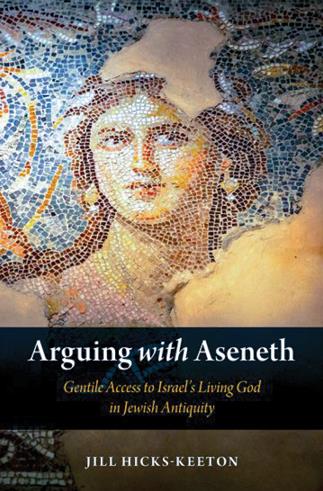Book Review: Arguing with Aseneth
020

The story of the Hebrew patriarch Joseph in Egypt is a fascinating and consequential one. The Bible shows Joseph being sold into slavery, becoming vizier, and saving his family during the seven years of famine, but it says almost nothing about his Egyptian wife, Aseneth. Recognized already in antiquity, this desideratum gave rise to legends, including the Jewish novel Joseph and Aseneth, which expands on what little is said in the Bible (Genesis 41; Genesis 46; Genesis 48) about Joseph and Aseneth, the idol-worshiping daughter of an Egyptian priest.
For centuries, scholars have been fascinated by this extra-canonical literary work, without ever reaching a consensus about why and for what purpose the novel may have been written. Was it to promote conversion in antiquity, as the portrayal of the remorseful and converting Aseneth may suggest? And how was it composed and copied that there are so many different versions of the work? Is it best accessed through the genre of Jewish conversion stories, or is it rather a much later, third- or fourth-century Christian narrative?
In her beautifully written and produced monograph, Jill Hicks-Keeton offers a fresh look at theses issues. Without dwelling much on the various theories about the provenance of the novel, Hicks-Keeton tries to read it from within, by identifying its main theme. This she finds in the concept of a “living God,” with which Israel and Judaism differed from all other ancient Near Eastern and Mediterranean religions.
This religious concept enjoyed a lot of attention after Alexander the Great had introduced Hellenism—a way of thinking many Jewish people learned to embrace, and one that allowed many Greek-educated gentiles to become interested in Judaism.
Hicks-Keeton focuses on Joseph and Aseneth as not so much promoting an 022actual conversion process as making Judaism more attractive and accessible in its belief in a God different from all “dead” idols of the other peoples. More specifically, the author’s thesis is that Joseph and Aseneth was written not as rhetoric to convert gentiles, as the Book of Jubilees and the apostle Paul argued for, but rather to ease access for gentiles to Israel and its “living God.”
The author examines the provenance of Joseph and Aseneth: from the way it interprets Genesis to how boundaries are defined in Deuteronomy and the Deuteronomistic History to the various approaches to life, death, and the living God in Hellenistic Judaism. She also explores the inclusion of gentiles in the Book of Jubilees and Paul’s letters as compared to that in Joseph and Aseneth.
Whereas the final word about Joseph and Aseneth has not been said yet and may never be, the value of Hicks-Keeton’s careful study lies in the way she situates the work in the wider Greco-Roman world, in which Judaism found itself navigating a multicultural environment. Its different approaches of adaptation, assimilation, and rejection to the new culture could also result in different ways of adopting other cultural elements and people into its own world. Whereas it employs a sensitive balance between different theological threads from the books of Genesis and Deuteronomy on the one hand and the conventions of the ancient Greek novel on the other, the novel also allows people from outside to enter the Jewish world, even to the extent that an Egyptian idol-worshiping woman can convert to the one true God. By doing so, Aseneth became not only the mother of Joseph’s sons but even a symbol of God’s openness to anyone who wishes to follow the same path.
This has made Joseph and Aseneth different from many other Jewish works in antiquity. And Hicks-Keeton’s innovative, refreshing approach won her the 2020 Manfred Lautenschlaeger Award for Theological Promise.
The story of the Hebrew patriarch Joseph in Egypt is a fascinating and consequential one. The Bible shows Joseph being sold into slavery, becoming vizier, and saving his family during the seven years of famine, but it says almost nothing about his Egyptian wife, Aseneth. Recognized already in antiquity, this desideratum gave rise to legends, including the Jewish novel Joseph and Aseneth, which expands on what little is said in the Bible (Genesis 41; Genesis 46; Genesis 48) about Joseph and Aseneth, the idol-worshiping daughter of an Egyptian priest. For centuries, scholars have been fascinated by this extra-canonical literary […]
You have already read your free article for this month. Please join the BAS Library or become an All Access member of BAS to gain full access to this article and so much more.
